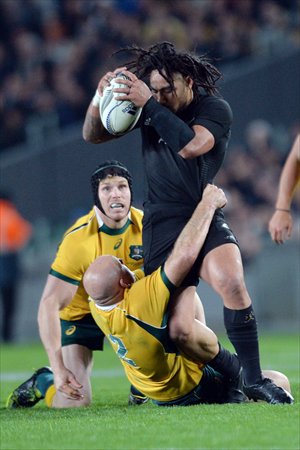HOME >> SPORTS
Wallaby win gives rest of world hope
Source:AFP Published: 2015-9-3 23:18:32
History against All Blacks as the quadrennial Cup fortnight away

Maa Nonu of New Zealand controls the ball against Stephen Moore of Australia during their Rugby Championship match on August 15 in Auckland, New Zealand. Photo: IC
That New Zealand have been the team to beat ahead of every World Cup has long been accepted by the rest of the international rugby union community.
But that the All Blacks have managed, for the time being at least, to defy conventional medicine by including wing Waisake Naholo in their squad might be a bit too much for rivals trying to plot the downfall of the defending champions, with the 2015 edition in England a fortnight away.
The Fijian healer who treated Naholo's rapid recovery from a broken leg put his success down to belief in God and a curative leaf.
Fortunately for fans of other teams, history is against New Zealand.
No side have ever won successive World Cups, while the All Blacks have yet to lift the Webb Ellis trophy on foreign soil - with both their 1987 and 2011 triumphs being sealed with wins over France in finals at Auckland's Eden Park.
The way Australia defeated New Zealand 27-19 in a Rugby Championship decider in Sydney last month ought to have inspired the rest of the world.
New Zealand hit back with a 41-13, five-tries-to-one win over the Wallabies in Auckland.
'Massive lesson'
But the joy and pain of knockout rugby is that one defeat can prove fatal to a team's hopes - something New Zealand coach Steve Hansen knows only too well from his time as assistant to Graham Henry, when the All Blacks suffered a shock quarterfinal defeat by France in Cardiff at the 2007 World Cup.
"The difference with the World Cup is you get four games guaranteed and if you're good enough to run first or second in your pool you get one more," said Hansen.
"We learnt a massive lesson in 2007. If you don't win that one you come home."
No wonder then that Hansen said when naming his squad, "We are not defenders; like everyone else, we are contenders."
Australia's win over New Zealand certainly made the rest of the world take notice.
Doubts remain about the Wallaby scrum and they have been drawn in a tough pool featuring both Wales and hosts England that also includes dangerous outsiders Fiji.
At least one of rugby's major nations will bow out from the "group of death," with only the top two going through to the quarterfinals.
Significantly, Wales coach Warren Gatland, whose side beat Six Nations champions Ireland in a warm-up match in Dublin last weekend, chose not to goad the Wallabies, who have won their last 10 Tests against the Welsh, when asked to comment on his pool rivals.
"I am looking forward to the [warm-up] game this weekend between England and Ireland, because whoever loses is going to lose two in a row which puts them under a little bit of pressure," said Gatland, with England beaten 25-20 by France in Paris in their last warm-up encounter.
France, yet to win a World Cup, looked, at long last, to have found a measure of cohesion in beating England - a point not lost on Gatland.
"I've been impressed by France. They looked a lot fitter and stronger than they have for recent campaigns."
'Brawn over brain'
In leaving out Danny Cipriani, while including rugby league convert Sam Burgess, with just 70 minutes of Test rugby union behind him, England coach Stuart Lancaster has been accused of favoring brawn over game-breaking brain.
"I wouldn't describe it as a gamble," said Lancaster of Burgess' selection.
"I understand the size of this decision, but I understand the size of every decision when you're in a World Cup year."
England, who open the World Cup against Fiji at Twickenham on September 18, will now depend greatly on flyhalf George Ford to orchestrate their attack.
Fiji knocked Wales out of the 2007 World Cup and Gatland said, "If we go in there just thinking about the supposedly 'big three' teams [England, Australia and Wales] and underestimate Fiji, someone is going to get caught with their pants down."
South Africa, World Cup champions on home soil in 1995 and in France 12 years later, are always worth keeping an eye on.
Yet a reminder of the unique challenges they face came Monday when a minor political party went to court in an attempt to block the Springboks travelling to England, arguing there were too many white players in the squad.
Post-apartheid "transformation" remains a sensitive issue across all South African sport.
Agency for a New Agenda party leader Edward Mokhoanatse said Springbok coach Heyneke Meyer's squad, which includes a record nine black players, was "built on racially exclusionary and racially biased criteria."
Posted in: Feature, Rugby